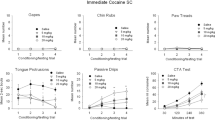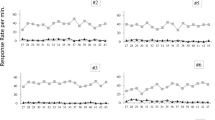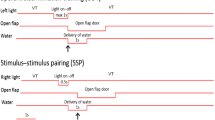Abstract
Classical conditioning of morphine hyperthermia was examined using an explicit conditioned stimulus (CS) paired with intravenous (IV) morphine administration. Rats were implanted with a jugular vein cannula and a biotelemetry device for monitoring body temperature. The animals were housed 24 h/day in the chambers in which all testing occurred. The CS was a 15-min light/noise stimulus. The unconditioned stimulus (US) was an infusion of morphine (5 mg/kg). Rats were assigned to either the Paired group, which received morphine with the CS, or the Unpaired group, which received explicitly unpaired presentations of the CS and US. The CS-morphine pairings resulted in development of a conditioned hyperthermic response in the Paired group evoked by the CS in the absence of morphine. The development of morphine hyperthermia was more rapid in the Paired group in the presence of the CS than in its absence in the same group and more rapid in the Paired group than in the Unpaired group during the CS. These results clearly show that learning affects the response to morphine administered repeatedly. In contrast to previous studies, conditioned hyperthermia was elicited within 15 min by a discrete CS in a situation where the response was not confounded by handling or the stress of injection.
Similar content being viewed by others
References
Baker TB, Tiffany ST (1985) Morphine tolerance as habituation. Psychol Rev 92:78–108
Brown ZW, Amit A, Weeks JR (1976) Simple flow-thru swivel for infusions into unrestrained animals. Pharmacol Biochem Behav 5:363–365
Crowell CR, Hinson RE, Siegel S (1981) The role of conditional drug responses in tolerance to the hypothermic effects of ethanol. Psychopharmacology 73:51–54
Cunningham CL, Bischof LL (1986) Effects of contextual learning on body temperature. Presented at the annual meeting of the Western Psychological Association, Seattle
Cunningham CL, Peris J (1983) A microcomputer system for temperature biotelemetry. Behav Res Methods Inst 15:598–603
Cunningham CL, Schwarz KS (1989) Pavlovian-conditioned changes in body temperature induced by alcohol and morphine. Drug Dev Res 16:295–303
Donegan NH, Wagner AR (1987) Conditioned diminution and facilitation of the UR: A sometimes opponent-process interpretation. In: Gormezano I, Prokasy WF, Thompson RF (eds) Classical conditioning. Erlbaum, Hillsdale, NJ, pp 339–369
Eikelboom R (1986) Learned anticipatory rise in body temperature due to handling. Physiol Behav 37:649–653
Eikelboom R, Stewart J (1981a) Conditioned temperature effects using amphetamine as the unconditioned stimulus. Psychopharmacology 75:96–97
Eikelboom R, Stewart J (1981b) Temporal and environmental cues in conditioned hypothermia and hyperthermia associated with morphine. Psychopharmacology 72:147–153
Eikelboom R, Stewart J (1982) Conditioning of drug-induced physiological responses. Psychol Rev 87:507–528
Gormezano I, Kehoe EJ (1975) Classical conditioning: some methodological-conceptual issues. In: Estes WK (ed) Handbook of learning and cognitive processes, vol 2: Conditioning and behavior theory. Erlbaum, Hillsdale, NJ, pp 143–179
Greeley J, Cappell H (1985) Associative control of tolerance to the sedative and hypothermic effects of chlordiazepoxide. Psychopharmacology 86:487–493
Gunne L-M (1960) The temperature response in rats during acute and chronic morphine administration: a study of morphine tolerance. Arch Int Pharmacodyn Ther 129:416–428
Hinson RE, Poulos CX (1981) Sensitization to the behavioral effects of cocaine: modification by Pavlovian conditioning. Pharmacol Biochem Behav 15:559–562
Hinson RE, Siegel S (1986) Pavlovian inhibitory conditioning and tolerance to pentobarbital-induced hypothermia in rats. J Exp Psychol [Anim Behav] 12:363–370
Lal H, Miksic S, Smith N (1976) Naloxone antagonism of conditioned hyperthermia: an evidence for release of endogenous opioid. Life Sci 11:971–976
Le AD, Poulos CX, Cappell H (1979) Conditioned tolerance to the hypothermic effect of ethyl alcohol. Science 206:1109–1110
Mansfield JG, Cunningham CL (1980) Conditioning and extinction of tolerance to the hypothermic effect of ethanol in rats. J Comp Physiol Psychol 94:962–969
Mansfield JG, Wenger JR, Benedict RS, Halter JB, Woods SC (1981) Sensitization to the hyperthermic and catecholamine-releasing effects of morphine. Life Sci 29:1697–1704
Melchior CL, Tabakoff B (1981) Modification of environmentally cued tolerance to ethanol in mice. J Pharmacol Exp Ther 219:175–180
Rescorla RA (1969) Pavlovian conditioned inhibition. Psychol Bull 72:77–94
Schwarz KS, Cunningham CL (1988) Tolerance and sensitization to the heart-rate effects of morphine. Pharmacol Biochem Behav 31:561–566
Sherman JE (1979) The effects of conditioning and novelty on the rat's analgesic and pyretic responses to morphine. Learn Motiv 10:383–418
Siegel S (1975) Evidence from rats that morphine tolerance is a learned response. J Comp Physiol Psychol 89:498–506
Siegel S (1978) Tolerance to the hyperthermic effect of morphine in the rat is a learned response. J Comp Physiol Psychol 92:1137–1149
Siegel S, Hinson RE, Krank MD, McCully J (1982) Heroin “overdose” death: the contribution of drug-associated environmental cues. Science 216:436–437
Siegel S, Krank MD, Hinson RE (1987) Anticipation of pharmacological and nonpharmacological events: classical conditioning and addictive behavior. J Drug Issues 17:83–109
Stewart J, Eikelboom R (1987) Conditioned drug effects. In: Iversen LL, Iversen SD, Snyder SH (eds) New directions in behavioral pharmacology. Plenum Press, New York, pp 1–57
Taukulis HK (1986) Conditional shifts in thermic responses to sequentially paired drugs and the “conditional hyperactivity” hypothesis. Pharmacol Biochem Behav 25:188–196
Tilson HA, Rech RH (1973) Conditioned drug effects and absence of tolerance tod-amphetamine induced motor activity. Pharmacol Biochem Behav 1:149–153
Vasko MR, Domino EF (1978) Tolerance development to the biphasic effects of morphine on locomotor activity and brain acetylcholine in the rat. J Pharmacol Exp Ther 207:848–858
Wagner AR (1976) Priming in STM: An information processing mechanism for self-generated or retrieval-generated depression in performance. In: Tighe TJ, Leaton RN (eds) Habituation: perspectives from child development, animal behavior, and neurophysiology. Erlbaum, Hillsdale, NJ, pp 95–128
Weeks JR (1972) Long-term intravenous infusion. In: Myers RD (ed) Methods in psychobiology, vol 2. Academic Press, London, pp 155–168
Zelman DC, Tiffany ST, Baker TB (1985) Influence of stress on morphine-induced hyperthermia: relevance to drug conditioning and tolerance development. Behav Neurosci 99:122–144
Author information
Authors and Affiliations
Rights and permissions
About this article
Cite this article
Schwarz, K.S., Cunningham, C.L. Conditioned stimulus control of morphine hyperthermia. Psychopharmacology 101, 77–84 (1990). https://doi.org/10.1007/BF02253722
Received:
Revised:
Issue Date:
DOI: https://doi.org/10.1007/BF02253722




